
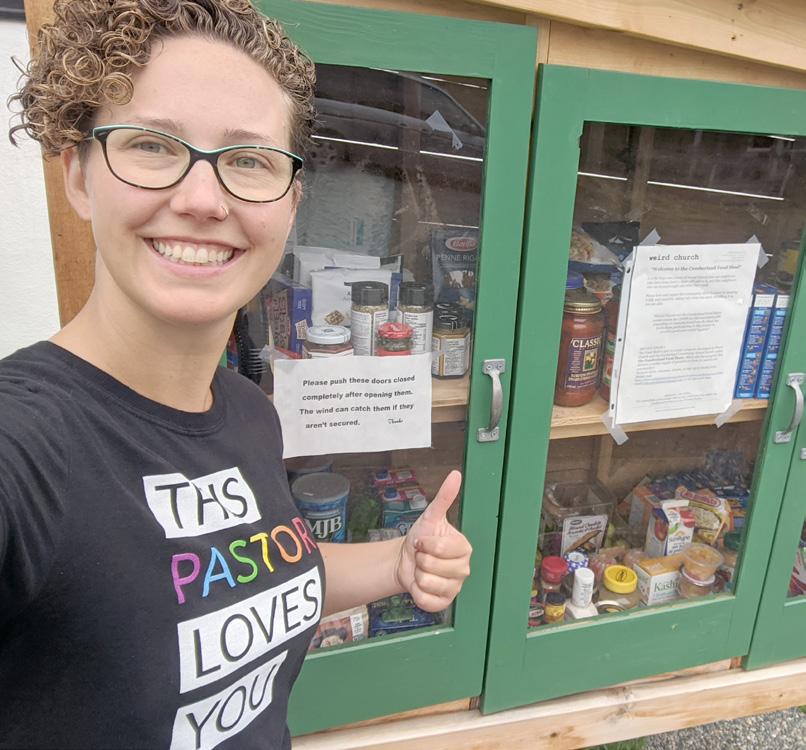



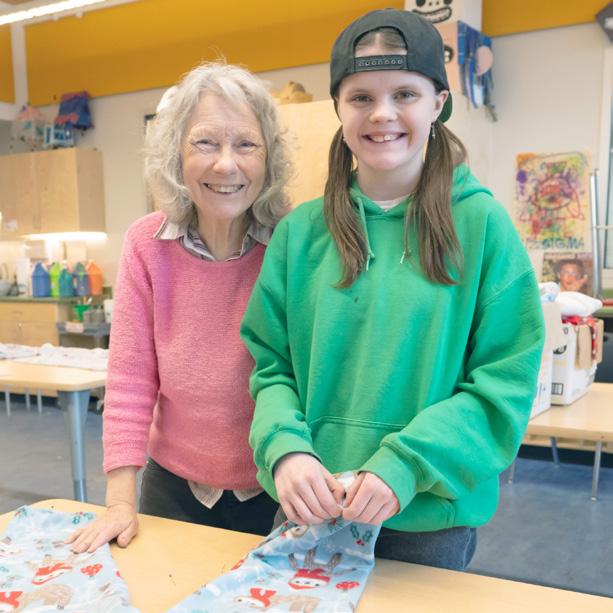
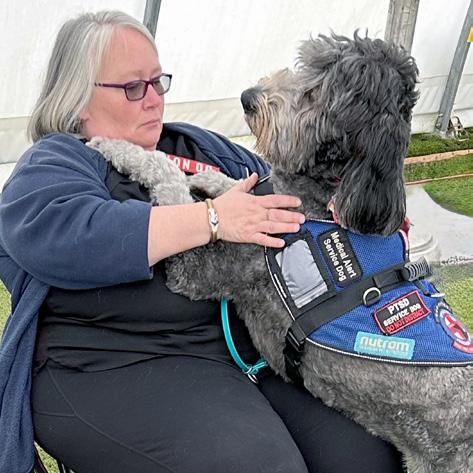


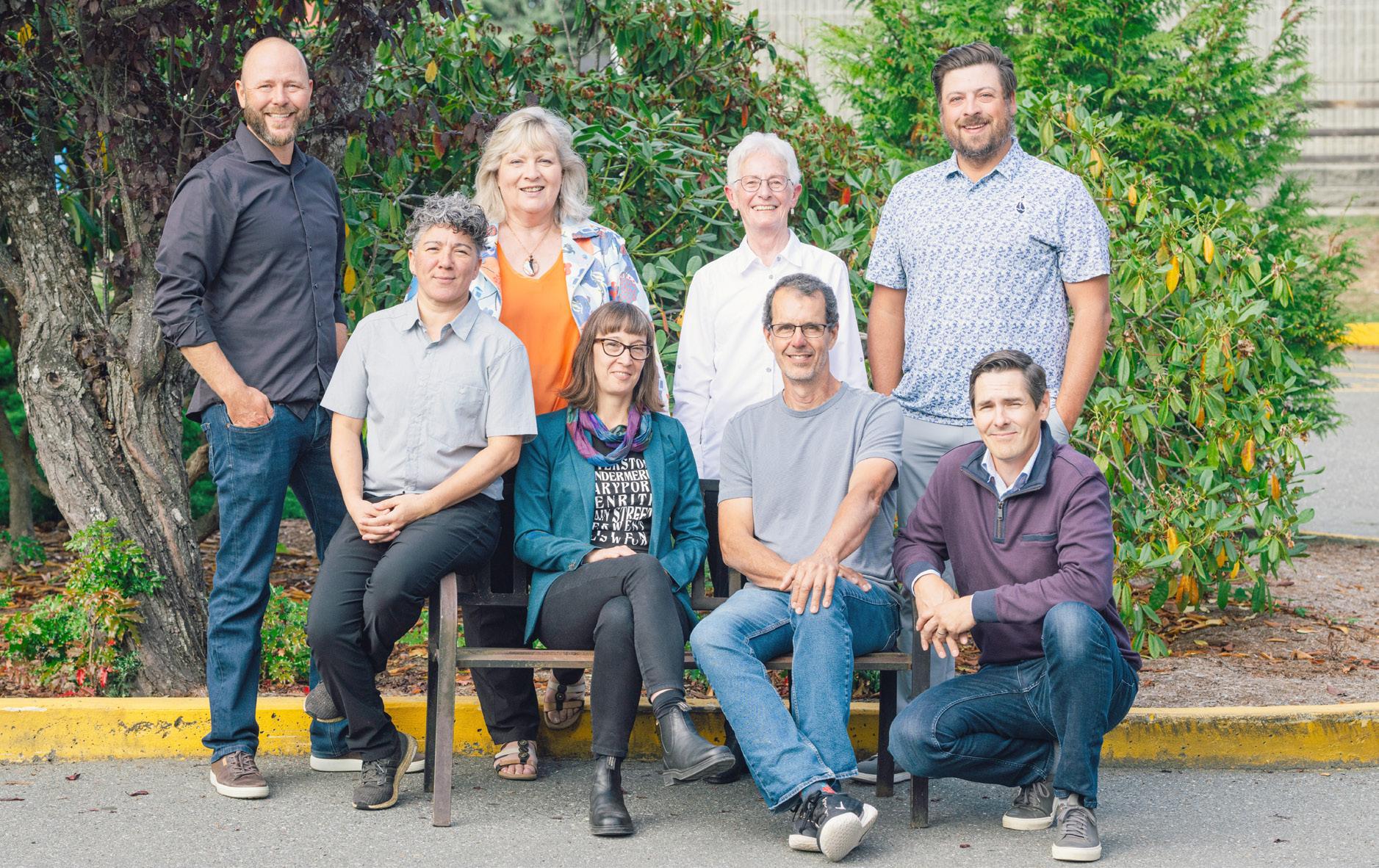
2024/25 BY THE NUMBERS
$1.33M DISTRIBUTED IN GRANTS, SCHOLARSHIPS & DESIGNATED FUNDS
Every day at the Community Foundation, we witness the incredible work of local nonprofits who drive positive change and strengthen community wellbeing.

For nearly three decades, the Comox Valley Community Foundation has been dedicated to enriching life in the Comox Valley. By connecting caring people with causes that matter, we invest in the people, opportunities, and solutions that build a stronger, more resilient community.
Through immediate impact gifts and longterm invested funds, we steward vital support to
“The strength of our community shines through those who serve it each day. ”
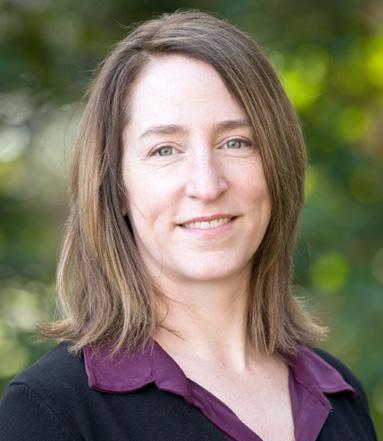
Jolean Finnerty, Executive Director


community service organizations each year — ensuring today’s generosity creates lasting benefit for generations to come.


While the challenges facing Comox Valley communities are great, so too is the spirit of those working to make a difference.
“The strength of our community shines through those who serve it each day,” says Jolean Finnerty, executive director of the Foundation. “We know the demand for their services and efforts are great, and we are so thankful for the many non-profit partners who work with us to strengthen and support community.
Together, we are not only meeting today’s challenges — we are building a stronger, more connected future.
53 LOCAL ORGANIZATIONS SUPPORTED

65 STUDENT EMPOWERED THROUGH EDUCATION
30 NEIGHBOURHOOD PROJECTS INITIATED



This year’s Impact Report celebrates the power of collaboration — through stories that represent just a few of the many partnerships that the Foundation is proud to support.
We invite you to join us in celebrating this year’s grant recipients and discover the incredible work taking place throughout the Comox Valley, made possible through community giving.
$341K COMMUNITY LOANS IN ACTION
$1.52M IN NEW REVENUE FOR TODAY & TOMORROW
107 LEGACY FUNDS UNDER MANAGEMENT

$18.1M HELD IN NET ASSETS


$7.3M GRANTED TO THE COMMUNITY SINCE 1996
We respectfully acknowledge the Comox Valley is the Unceded Traditional Territory of the K’ómoks First Nation, and are committed to truth and reconciliation through ongoing learning and meaningful action.
In a quiet corner of West Courtenay, something exceptional is happening after the final school bell rings.
At Lake Trail Community School, classrooms and gardens come alive, filled with intergenerational laughter, learning, and the warmth of community — thanks to the Lake Trail Community Education Society.
For Roderick, a full-time working father and widower, these after-school programs have made all the difference. His daughter and son have been welcomed by staff for years, even before one of them was old enough to officially attend.
What began as a convenient after-school option three or four days a week has become a vital source of support for dozens of local families.

“It’s more than just fun activities,” Roderick said. “It’s about learning life skills—gardening, cooking, crafting, teamwork, compassion. Sometimes a little hard work and helping someone else is what really builds a stronger community.”
That community spirit is exactly what the Education Society was built to nurture. As a charitable organization based out of Lake Trail Community School, it has transformed after-hours hallways into a vibrant hub of connection. From free youth programming and a thriving community garden to drop-in nights, cooking classes, and a salad bar that serves hundreds of students each week, the society makes its programs accessible— financially and physically.
Founded nearly 15 years ago by a group of community members, it is now an essential part of life in West Courtenay. Its work addresses food insecurity, mental wellness,
“There’s nothing better than strengthening your community from the inside out.”



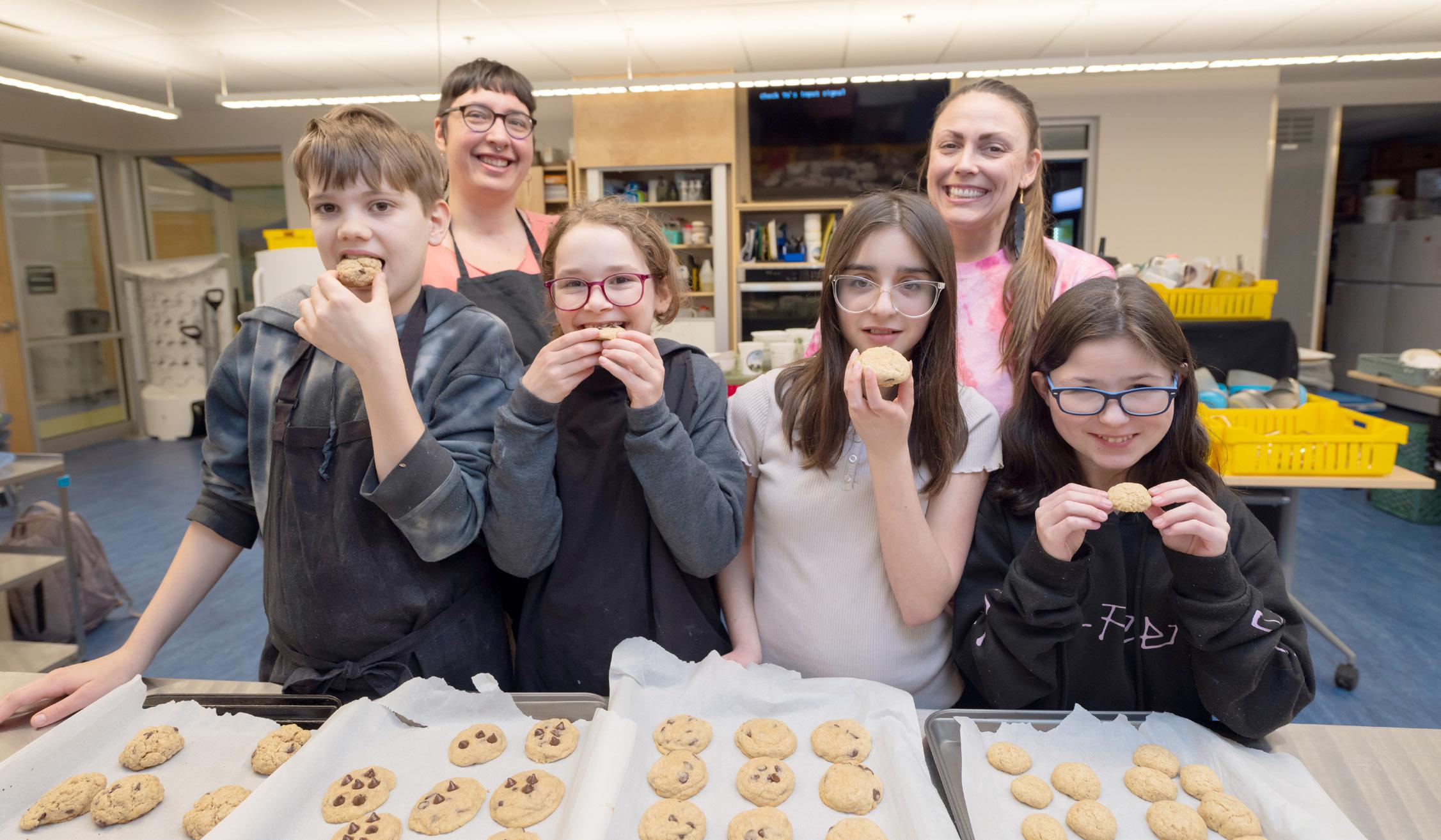
and inclusion, guided by one central belief: everyone deserves to feel they belong.
Last year, the Society offered 23 free after-school programs and expanded its reach with a mobile food pantry, community drop-in nights and workshops, and supports for young people, including marginalized youth. Most of the programs are free or low-cost, driven by community interest and need.


“We’re really guided by what the community wants,” said Anna Rambow, the Society’s executive director. “Sometimes students come to us and say they want to learn to sew or make stop motion animation. Other times, it’s a community member who has the time and energy to offer a skill, and we find out if students are interested.”
“We help the community support each other,” said Rambow. “It’s beautiful to watch families come together to build relationships with one another, even beyond our programs. We are just the framework for connection. Our goal is to keep offering spaces where people feel connected, supported, and valued.”
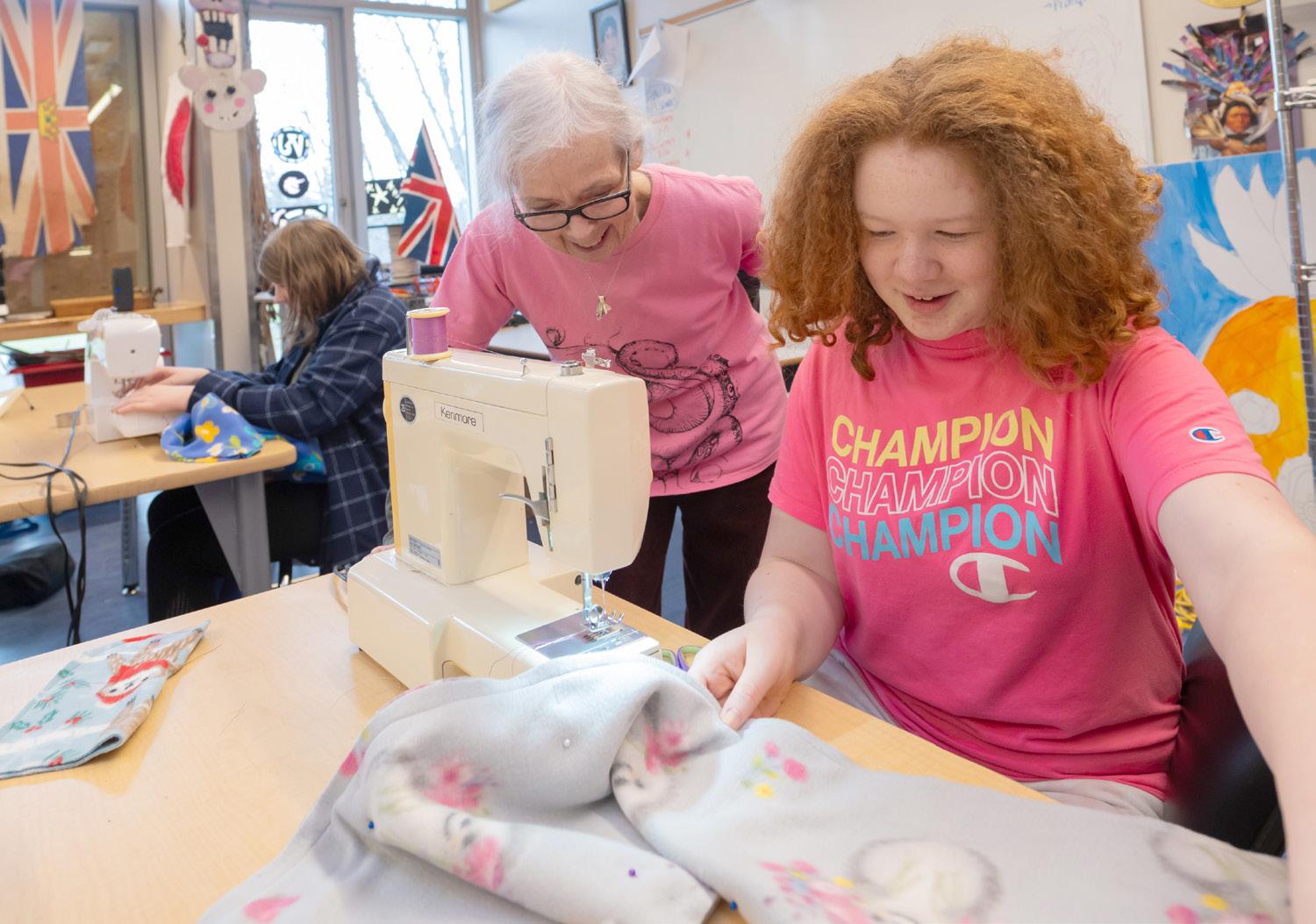
For Roderick, the impact is personal. “Not all families can afford extra programs, but this gives our kids a chance to grow and thrive,” he said. “There’s nothing better than strengthening your community from the inside out.”
And that’s exactly what the Lake Trail Community Education Society is doing — one connection at a time.
LEARN MORE
For more information, drop by Community Connection Days May 8-10 or visit ltces.ca.
The Hornby Island Housing Society is ensuring local seniors have affordable homes by replacing outdated propane heating systems with high-efficiency heat pumps.
Two of the 11 units at The Elder Village — Hornby Island’s senior housing complex — were previously heated by a propanebased system. The original system, installed in 1997, was decommissioned this spring and replaced with individual electric heat pumps.
“This transition is about more than just improved energy efficiency — it’s about security, sustainability, and affordability for our seniors,” said JoAnn Harrison, president of the Hornby Island Housing Society. “Heat pumps also have the highest impact on our residents—who pay for their own heat.”


The benefits are wide-reaching. The new heat pumps are expected to significantly lower heating bills — offering vital savings for seniors on fixed incomes. The units also provide air conditioning, increasingly essential as climate change brings hotter summers.
“The tenants are thrilled,” Harrison said. “The heat pumps have increased their comfort and lowered their annual costs.”

“This upgrade isn’t just a renovation — it’s a lifeline. It ensures our seniors can continue to live safely and affordably, without having to leave the island they call home.”
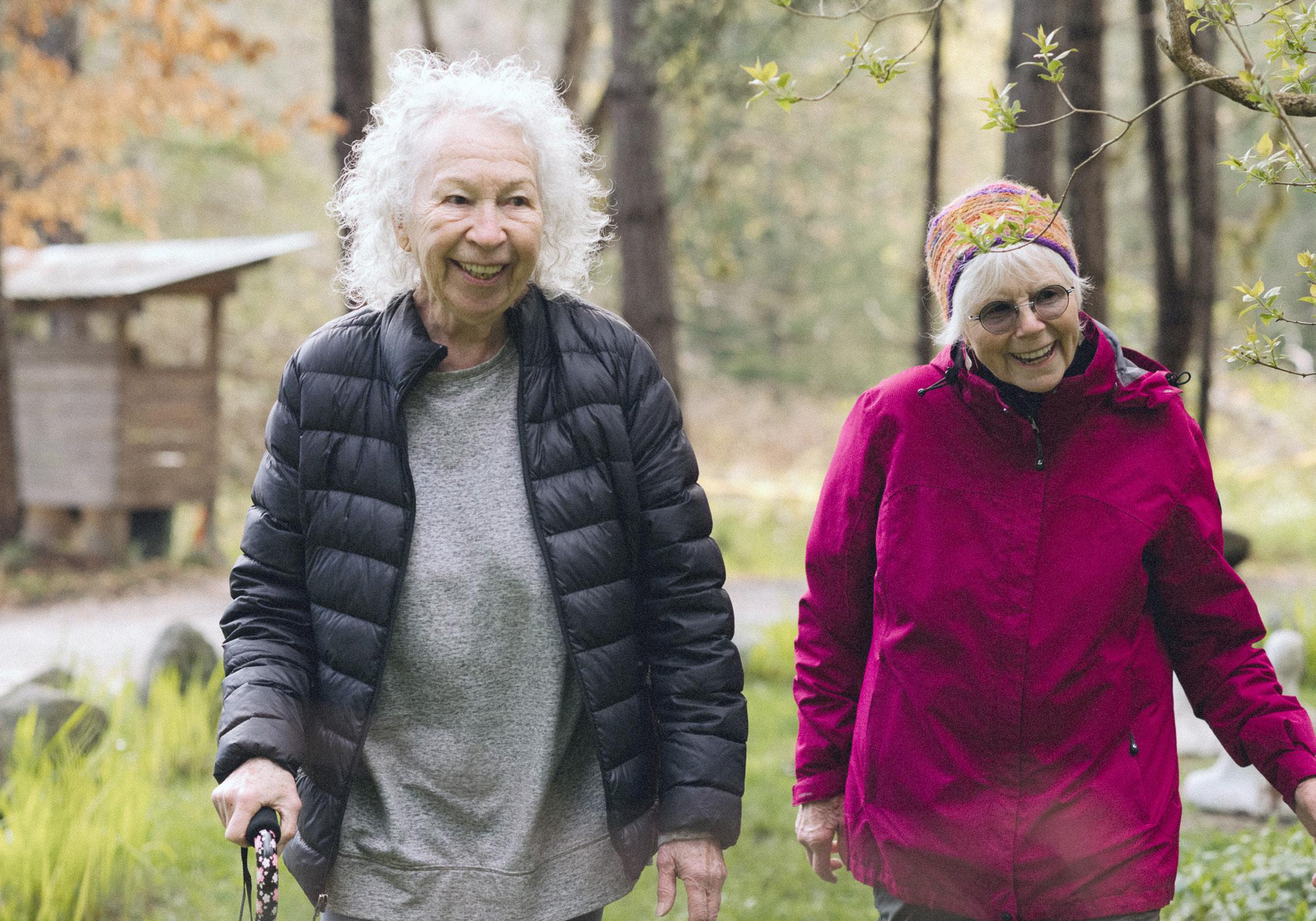
The Elder Village is home to 11 seniors and plays a valuable role in a community with very few, affordable year-round rentals.
The Society currently has what Harrison describes as a “dauntingly long” waitlist of seniors seeking accommodation, many of whom face mobility challenges and require accessible, single-level homes like those offered at the Village.
Though other housing options occasionally become available, few on Hornby are truly suitable for seniors. Many homes rely on wood heat, lack proper plumbing or cooking facilities, or are simply unaffordable.
The Village offers the opposite: wellmaintained, fully equipped homes with electric heating, running water, and garbage and recycling pickup — all on beautifully landscaped grounds designed for aging in place.
A 2022 Community First study conducted by the Housing Society confirmed the growing shortage of affordable rentals on the island — especially for seniors, which made up more than 44 per cent of the population in 2021, according to Statistics Canada.


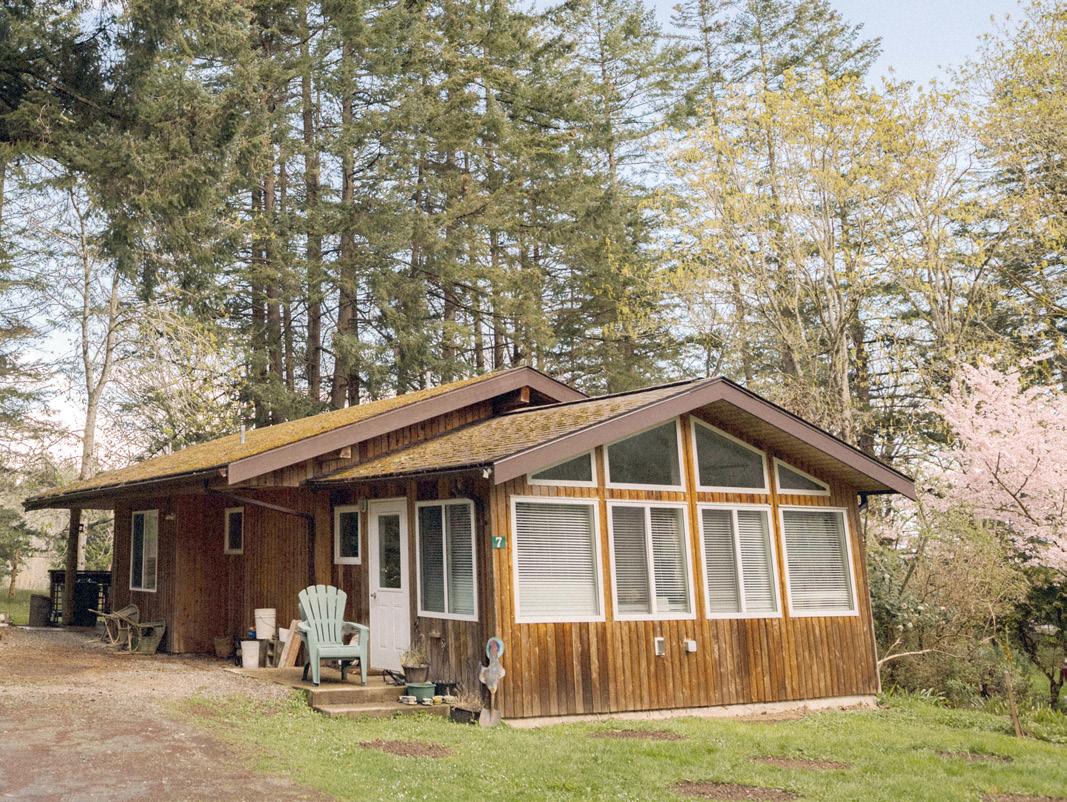
“In a small community like ours, every rental unit matters,” said Harrison.
“This upgrade isn’t just a renovation — it’s a lifeline. It ensures our seniors can continue to live safely and afforadably — without having to leave the island they call home.”
LEARN MORE
For more information , on Hornby Island Housing Society projects, visit hornbyhousing.org.
dogs bring new life to people living with complex trauma
At Operation Freedom Paws (OFP) Canada, life-changing healing begins in the Comox Valley, one paw at a time.
The Comox Valley–based non-profit pairs dogs with people living with complex trauma, including veterans, first responders, RCMP officers, and civilians.
Most of the dogs come from rescue shelters, and each is matched to specific client’s physical and psychological needs.
Unlike traditional service dog programs, where dogs are pre-trained, clients and their dogs learn side by side. They build trust and healing together twice a week over 48 weeks in Fanny Bay. When they are done, the dog is ready for a Service Dog Assessment and BC Guide Dog certification.
“They got their lives back. They can laugh again.”
To ensure there are no barriers to healing, the training — and the dogs — are provided completely free, with OFP Canada relying solely on charitable donations from community organizations to aid their support.
“We’re the only charity in Canada that trains both dogs and humans without charging for either,” said Barb Ashmead, the volunteer-run organization’s founder and executive director. “All we ask is a commitment to attend training twice a week and give it a try.”
Most clients are referred to OFP Canada through word of mouth, psychologists, and community organizations.
To meet growing needs, Ashmead is searching for an on-site mental health counsellor with experience in trauma counselling to help with intake interviews and provide ongoing support to clients. The Community Foundation grant will help fund the position.
“Thanks to the generosity of groups like the Comox Valley Community Foundation, OFP Canada continues to help people rebuild their lives after trauma,” she said.
The organization’s approach is backed by research, including a 2018 Purdue University study showing that PTSD service dogs significantly improve mental health, work attendance, and social functioning for veterans.
In just five years, the organization has seen 61 service teams become certified, with 46 coming from the Comox Valley. Clients also travel across Vancouver Island, Vancouver, and beyond to attend the training.
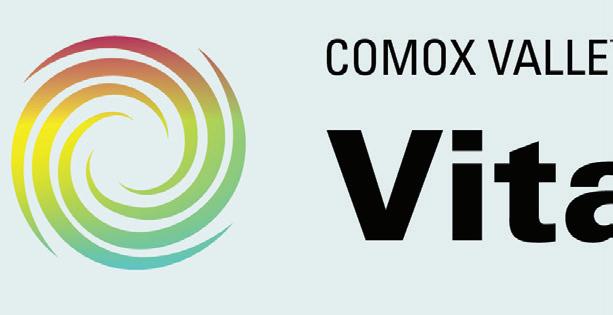

Alejandra and her service dog Teddy graduated last year as part of the OFP Canada training. In the last five years 61 service teams have been certified, including 46 teams from the Comox Valley.
Along with families and friends, the organization’s reach now touches an estimated 1,650 people on Vancouver Island, including 1,400 people in the Comox Valley alone.
greatest experience of her life. “Watching a team bond and save each others’ lives is phenomenal and an incredible life changing experience.”


Comox Valle y Vital Signs o ers over 60 local indicators on qualit y of life , trends and sustainable development goals to fo ster data- driven discussions that inspire the communit y.
Visit : como x-valle y-vital- sign s.tracking-progress .o rg .

Ashmead knows the results are both personal and far reaching.
She recalls one client struggling with severe PTSD and anxiety, so overwhelming he was afraid to leave his home. After working with Operation Freedom Paws, he and his dog now go everywhere together, living a fuller, more connected life.
“They got their lives back,” said Ashmead. “They can laugh again.”
The experience is, by all accounts, life-changing. And for Ashmead — the
From a community perspective, she knows families, friends, and entire communities benefit when people are able to return to work, finish school, and engage in healthy social activities.
LEARN MORE
For more information on OFP Canada, visit ofpcanada.org.

Each summer for the past three years, young adults with diverse abilities gather for a unique experience that blends outdoor adventure with empowerment and inclusion.
Known as Camp Sunshine, the day camp offers participants the chance to experience kayaking, stand-up paddleboarding, geocaching, tent building, and more over five days. Each activity is tailored to be accessible for individuals with diverse abilities. The camp is part of Project Inclusion, a program run by the Comox Valley Child Development Association. Its goal is to help young adults with diverse abilities build confidence, learn new skills, and foster meaningful connections.
Project Inclusion supports about 30 participants year-round as they work toward shared goals, including operating a spice business, cooking, hosting events, maintaining a garden, and even presenting at the annual Growing Together Conference for Childhood Educators in the Comox Valley.
“There is so much pride in everything that they do,” said Cindy Xavier, the association’s executive director.
Camp Sunshine takes those efforts outdoors, offering new experiences, challenges and opportunities.
“Good friends and great memories— that’s what Camp Sunshine is all about,” said Wendy Hawksworth, the program’s team lead. “Happiness is summer at the lake, where everyone is included, and




everyone leaves with new friends and a sense of belonging.”
Participants play an active role in planning camp activities, giving them a strong sense of ownership and pride.

“It doesn’t matter if they have a spotter or a navigator to get on the water—it’s about finding a way to build confidence and a sense of freedom through an experience many others take for granted,” Xavier said.
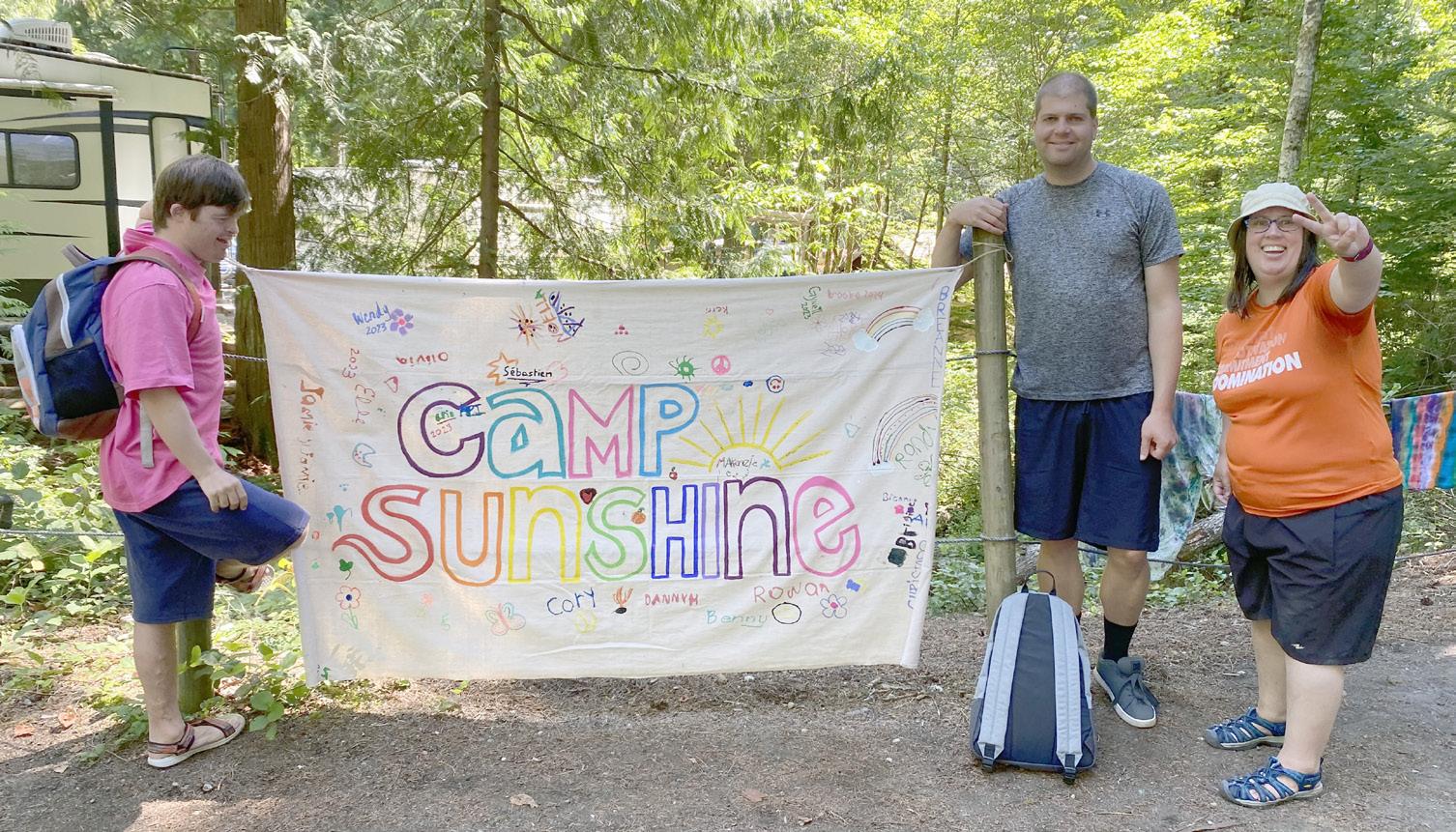

She emphasized that the camp wouldn’t be possible without community support— especially with increased participation and rising transportation costs.
“When the group heard we received funding for this year’s camp, they erupted in cheers,” Xavier said. “It allows them to try new activities, conquer fears, and enjoy outdoor adventures that are out of reach.”
Without this support, many participants would miss out on these enriching experiences. The barriers to accessible outdoor activities too often lead to isolation — but Camp Sunshine provides a joyful, inclusive environment where individuals grow, connect, and thrive.

“We are deeply grateful to all of the volunteers, staff, and donors who recognize the immense value of Camp Sunshine,” Xavier said. “From all of us, thank you from the bottom of our hearts.”
LEARN MORE

For more information about Project Inclusion, visit cvcda.ca.
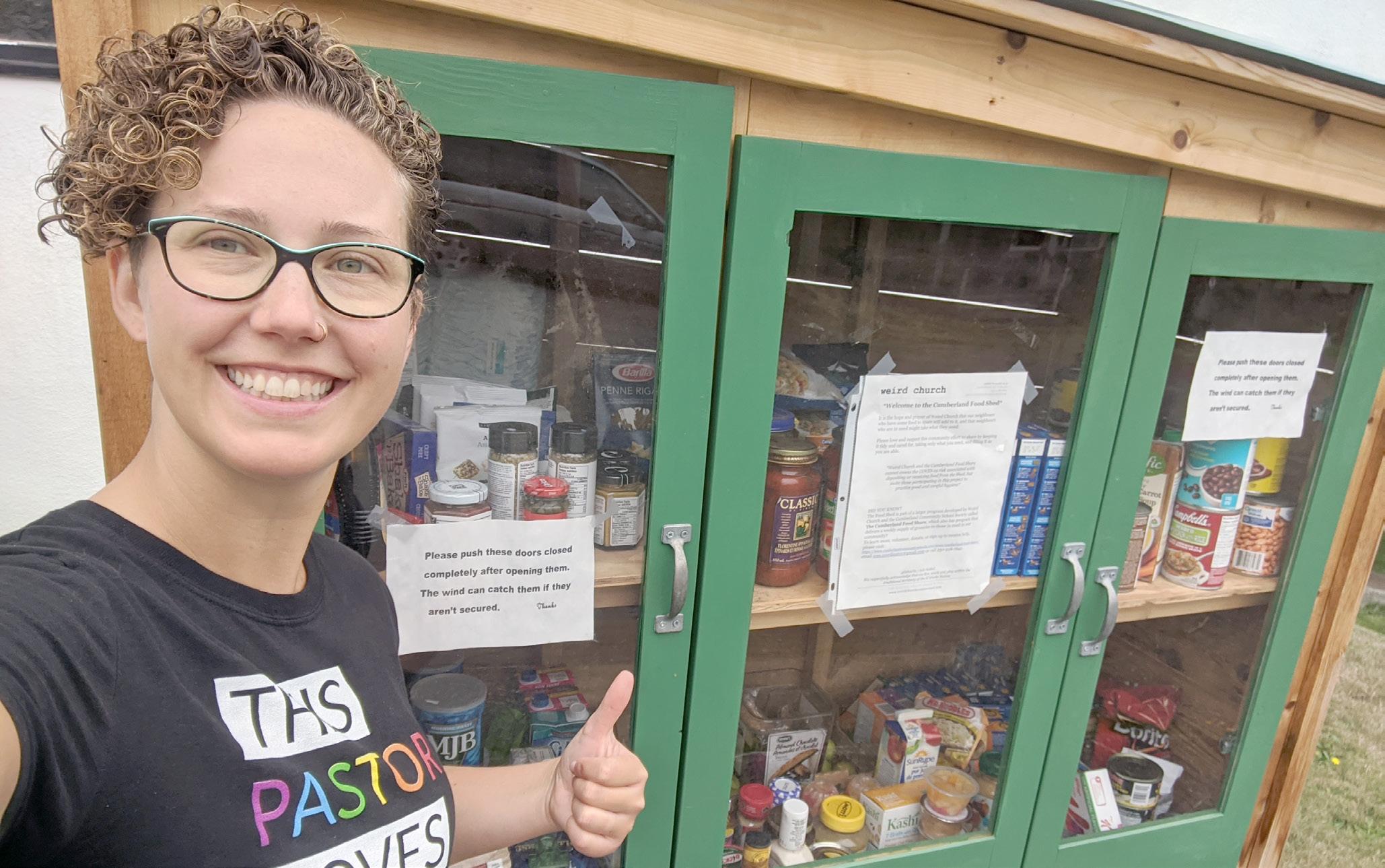


Rev. Ingrid Brown outside Weird Church’s 24-Hour Food Shed, which started during in 2020 to ensure those who needed food in Cumberland could find it. The Food Shed is one of three projects designed to improve accessibility to community activities, events, and services.





Sometimes, it’s the little things that make the biggest difference.
In Cumberland, Weird Church, officially known as the United Church of Canada - Pacific Mountain Region, has been a gathering place built on a foundation of love, justice, and community service since its inception in 2018. So, when an opportunity arose to improve food security, accessibility, and arts programming, Rev. Ingrid Brown knew it was a perfect fit.
“We’re all about being accessible and creating a place of belonging where everyone is welcome,” said Brown. “These upgrades will impact so many partners
“We’re all about being accessible and creating a place of belonging where everyone is welcome.”
and groups in Cumberland, especially in supporting arts programming, food security, and accessibility for all.”
Three major projects are now underway thanks to recent funding: much needed upgrades to the 24-hour food shed and shelving, renovations to the accessible ramp, and permanent black stage curtains.

First up is the Church’s food shed, where aging, wobbly shelves are being replaced after five years of constant use.
The food shed began during the COVID-19 pandemic, when school closures left many families without access to breakfast and lunch programs. Working with the Cumberland Community Schools Society and the Village of Cumberland through the Cumberland Food Share program, Brown and volunteers decided to set up outdoor shelves stocked with essential staples.

Today, with the support of the Cumberland Legion, Cumberland Rotary, and the Comox Valley Food Bank, the program has expanded significantly. The 24-hour food shed has seen usage rise by more than 300 per cent since its early days, with hundreds of pounds of food moving through it every month.



“People come by all the time — kids filling their backpacks after school, people stopping by at two or three in the morning,” Brown said. “I don’t even know exactly how much food goes through anymore — it happens all the time.”
Inside, Weird Church is adding permanent black stage curtains, made by a Cumberland resident, with fabric kept out of the landfill with the closing of a major Vancouver fabric store. The curtains will improve lighting and sound for local theatre groups and musicians, eliminating the need to rent equipment and allowing more of the groups’ limited budgets to go directly toward performances.
The changes – though small – help them remove barriers, support neighbours, and open the door to belonging for anyone who walks through their doors.
“We wanted to make sure there was food available for anyone who needed it,” said Brown. “It’s about neighbours helping neighbours in the best possible way.”
Weird Church is also overhauling its 35-year-old side access ramp, which had settled unevenly over time. Some boards were also unsafe due to water damage. The improved ramp will provide safer, easier access for people using wheelchairs, walkers, and other mobility aids. The improvements mean Weird Church becomes more available to all participants and provides another accessible location in Cumberland for community events.
For more information, visit Weird Church online at weirdchuchcumberland.com.

As food insecurity continues to rise in the Comox Valley, the Comox Valley Food Bank Society is taking steps to meet the growing demand.
With more than 4,000 monthly visits from individuals and families in need — and 7,800 registered users — the Society is expanding its capacity to safely store perishable foods with the installation of a new refrigerated container.
The Food Bank has doubled its cold storage space by installing a 20-foot refrigerated shipping container at its McPhee Avenue location.



New shipping container combats hunger with improved ability to save fresh food
This vital upgrade immediately increased food rescue capacity, adding 2,000 pounds of nutritious food every month. It enhances the Food Bank’s ability to save, distribute, and serve its direct clients and a network of 25 community partners, and food bank affiliates who

“With 110 new clients signing up each month, we’re facing a perfect storm of inflation, poverty, and rising food insecurity. This project allows us to respond with efficiency and compassion, ensuring no one in our community goes hungry.”
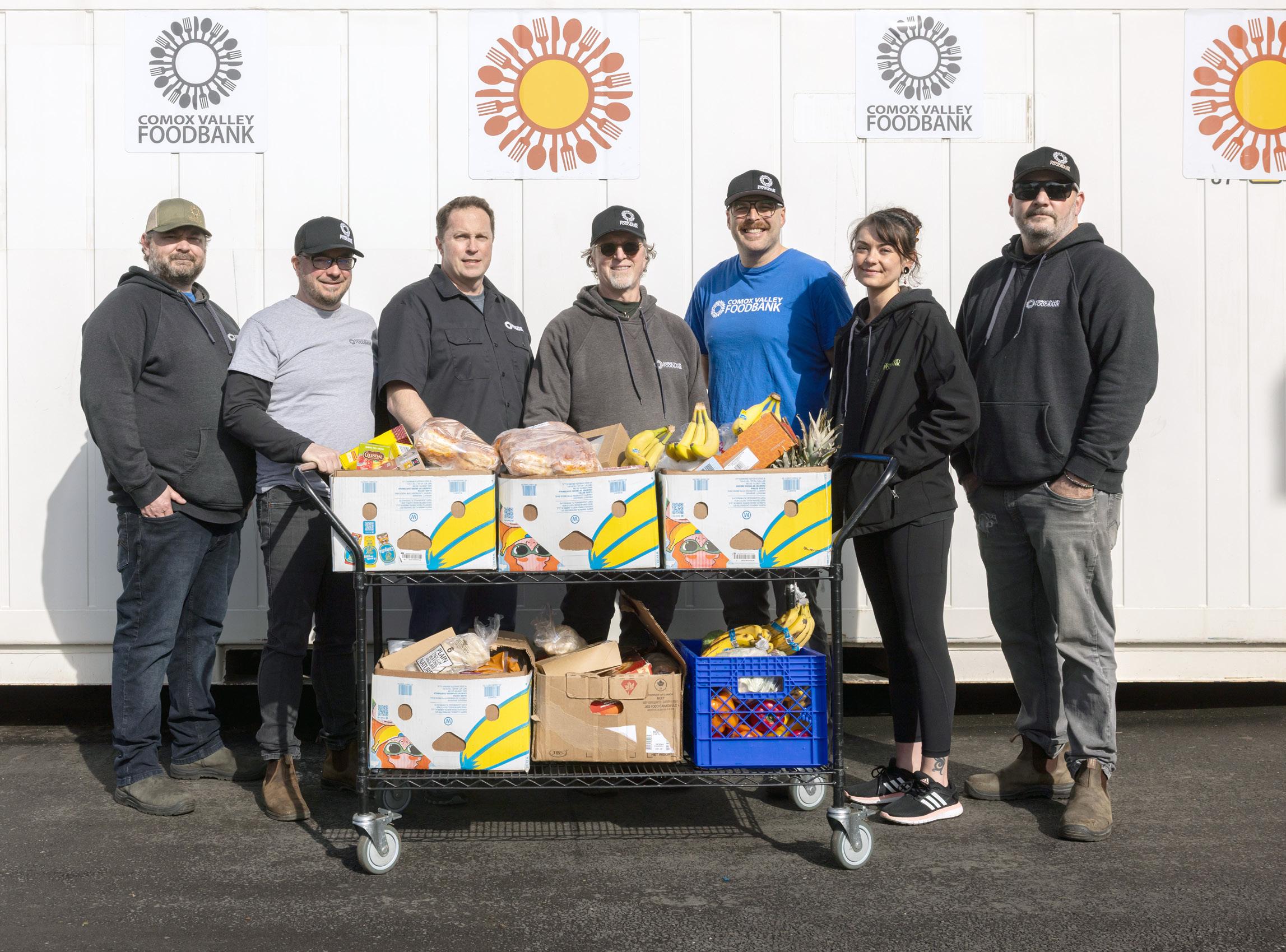
face similar challenges. The partners include a home delivery project, local schools, soup kitchens, and more.

“This project is about more than storage — it’s about delivering dignity, nutrition, and hope to thousands of people,” said David Reynolds, executive director of the Comox Valley Food Bank.
“Refrigeration is the heart of our food rescue program, and this expansion couldn’t come at a more critical time.”
Food rescue accounts for nearly 80 per cent of the fresh food distributed by the Food Bank, much of which includes perishable items such as fruits, vegetables, proteins, dairy, and meat alternatives.
Each week, drivers pick up food from farms, grocery stores, and vendors.


Volunteers and kitchen staff freeze what they can and make 500 to 600 meals a week turning some of the diverted food into soups, chilis and prepared food. But with only 200 square feet of cold storage, the organization has been operating at capacity — limiting its ability to accept and store rescued food.
“Fresh food allows people to make more healthy choices — rather than just shelf stable items which are also important,” said Reynolds. “Without increased fresh food storage, so much food in the Comox Valley would go to waste.”
The new unit is plug-and-play ready, fully secure, and capable of functioning as either a refrigerator or freezer.
Beyond preventing thousands of pounds of nutritious food from ending
up in landfills, the expanded storage will help prepare for an anticipated 30 per cent increase in new users in the next fiscal year.
“With 110 new clients signing up each month, we’re facing a perfect storm of inflation, poverty, and rising food insecurity,” Reynolds said. “This project allows us to respond with efficiency and compassion, ensuring no one in our community goes hungry.”
LEARN MORE
For more information about the Comox Valley Food Bank and how you can help, visit comoxvalleyfoodbank.ca.
The Beaufort Watershed Stewards (BWS) are on the lookout for a “canary in the coal mine”— only, in this case, the canary is a tiny, wiggly insect living under rocks in the streams and rivers of the Beaufort range watersheds.
The bottom-dwelling creatures, known as benthic invertebrates, are more vulnerable than fish. They can’t swim away from pollutants or poor water quality, making them excellent indicators of a stream’s health. While some of these invertebrates can adapt to deteriorating water conditions, many others simply die off. By lifting rocks, counting, and identifying these insects in different streams, trained citizen scientists can get a clear picture of the water’s health.


“The streams need a steward,” said Jill Chudleigh, of BWS. “With the growth of the region, pesticides, habitat and climate change, the water is affected — and by extension — so is everything that relies on the water in that stream. It’s important to monitor and protect it.”
The Beaufort Watershed Stewards is a group of volunteers who use an ecological and scientific approach to environmental conservation. Based on the east side of the Beaufort Range, the volunteers are dedicated to promoting the health and resilience of the watershed.


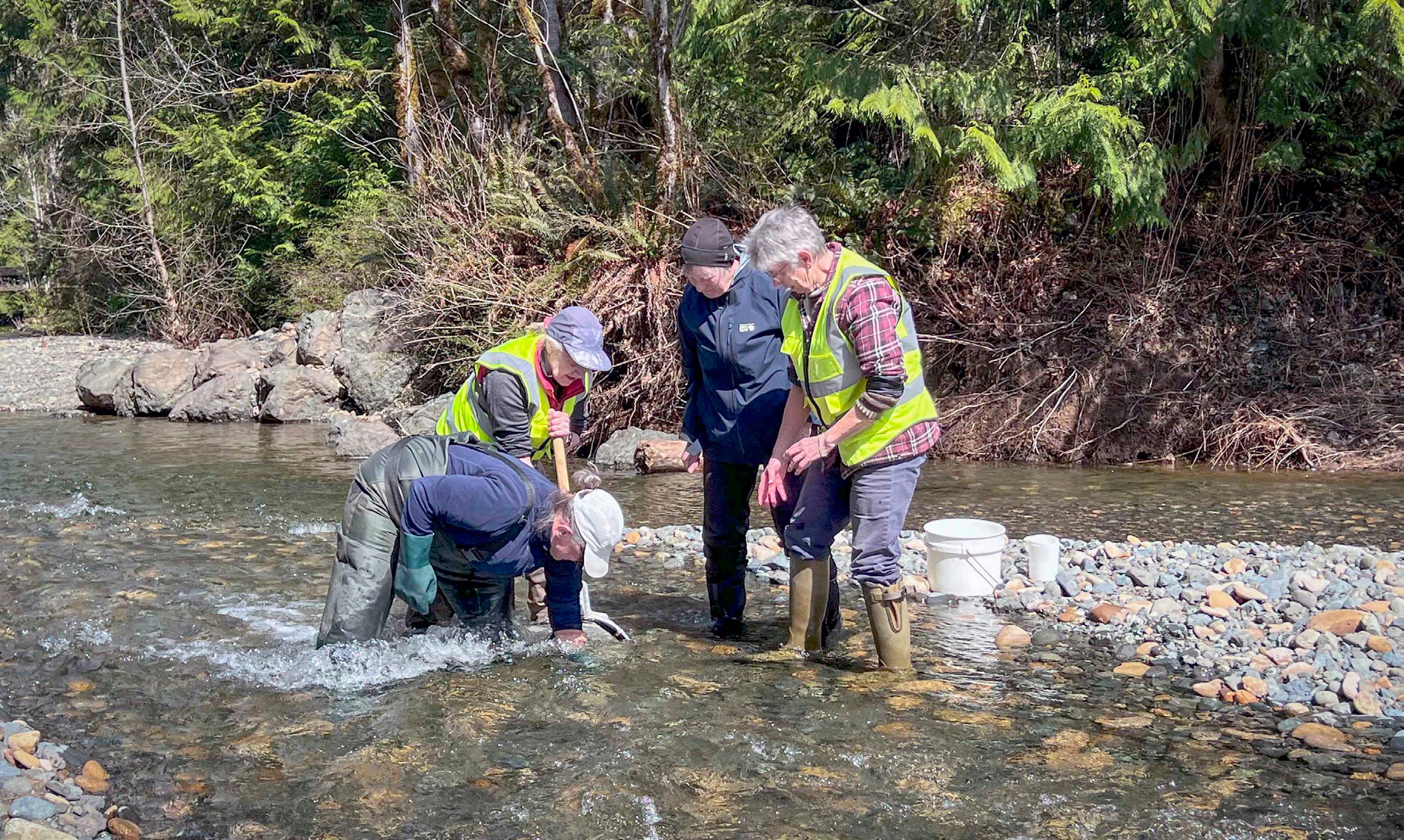

The benthic invertebrates surveying project is one of five new initiatives funded through the Comox Valley Community Foundation’s Environmental & Conservation Community Table, which convenes non-profits dedicated to environment, conservation, and climate resilience in the Comox Valley to discuss and distribute available grant funds together across various projects.

“With the growth of the region... the water is affected and by extension – so is everything that relies on the water in that stream. It’s important to monitor and protect it.”
The Beaufort Watershed Stewards’ grant made it possible to fund a Pacific Streamkeepers Federation trainer who instructed volunteers on how to properly collect and identify benthic invertebrates, and to record and interpret their findings.
The surveys take place twice a year, during different seasons, to establish a baseline invertebrate inventory in six streams. If the project proves successful, it could serve as a model for monitoring other streams in the watershed.
This project is one of six Citizen Science programs led by Beaufort Watershed
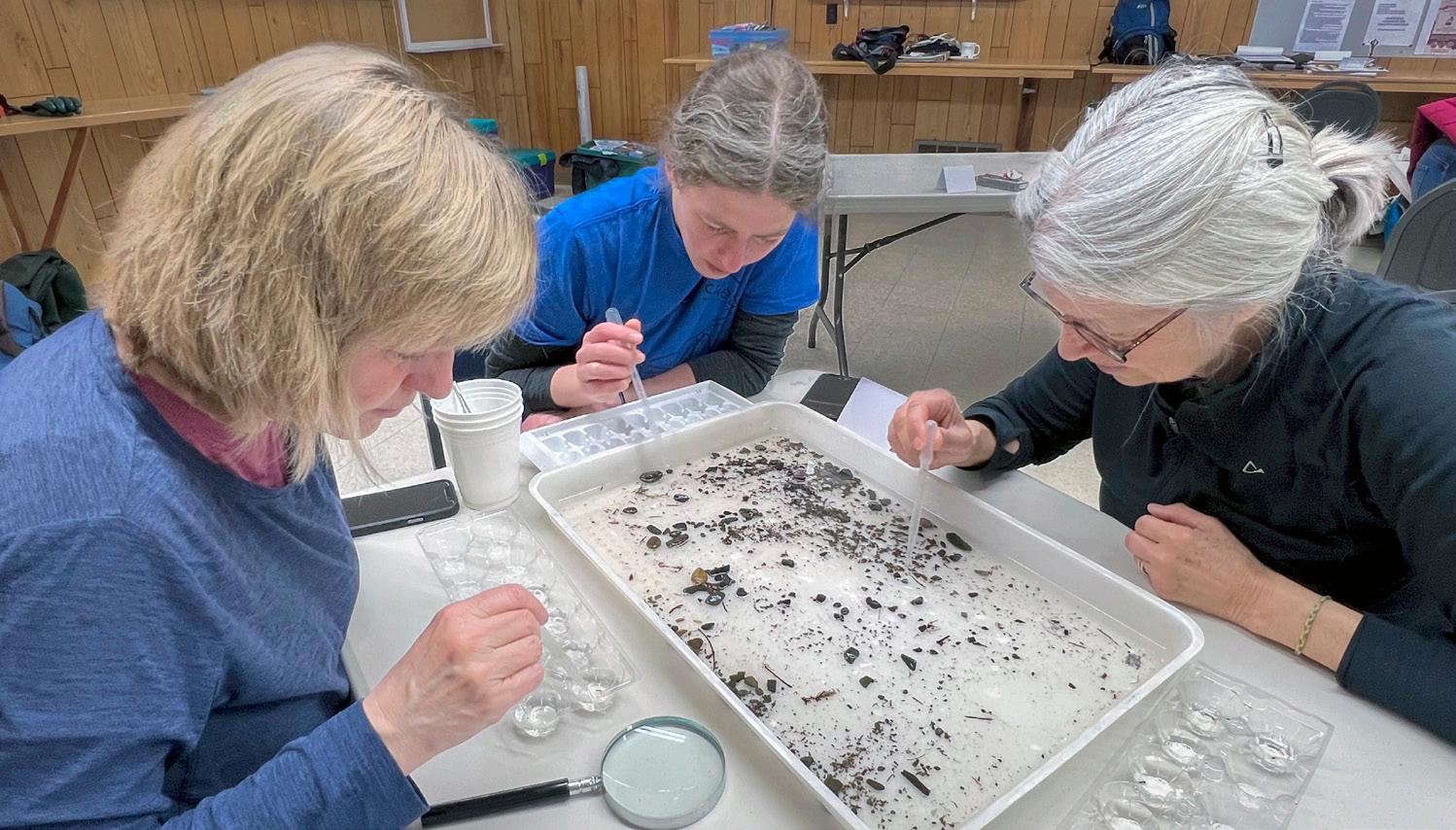
Steward volunteers. In addition to the benthic invertebrate survey, they monitor stream temperatures, turbidity, pH, specific conductivity and dissolved oxygen in 20 streams every two weeks.
They also measure stream flow speeds in five areas, track well water levels, and publish regular watershed health assessments.
Volunteers are involved in a tire wear toxin study with the BC Conservation
Foundation. Additionally, BWS is collaborating with UVic to map aquifers on the Beaufort range’s eastern slopes.
LEARN MORE
For more information, attend the River Never Sleeps event May 4 at the Rosewall Creek Hatchery or visit beaufortwater.org.
support makes a lasting impact — today and tomorrow
For nearly 30 years, the Comox Valley Community Foundation has been turning the generosity of individuals, families, and businesses into lasting community impact.
“Every project, initiative, and success story is made possible through community giving.” said Jolean Finnerty, the Foundation’s executive director. “In these times of growing need, every gift makes a difference.”
Today, more than 100 invested funds support local charities, non-profits, and community groups, helping to create a stronger, more connected Comox Valley for all.
Some of their stories are listed here, in the pages of this Impact Report. They are just a handful of the incredible non-profits and projects listed on the following page. But there are many more stories to tell.
“Every project, initiative, and success story is made possible through community giving.”
While the Foundation is grateful for the contributions and partnerships that have made these and other projects possible, there are a growing list of outstanding proposals that go unfunded each year.
More than 200 Comox Valley charities and non-profits connect seniors, support children and youth, improve mental health and support the environment, as well as respond to hunger and homelessness. Together, they are the backbone of our community and leading the way toward a more equitable Comox Valley where everyone can thrive.
In 2024, the Foundation received more than 40 Community Enrichment
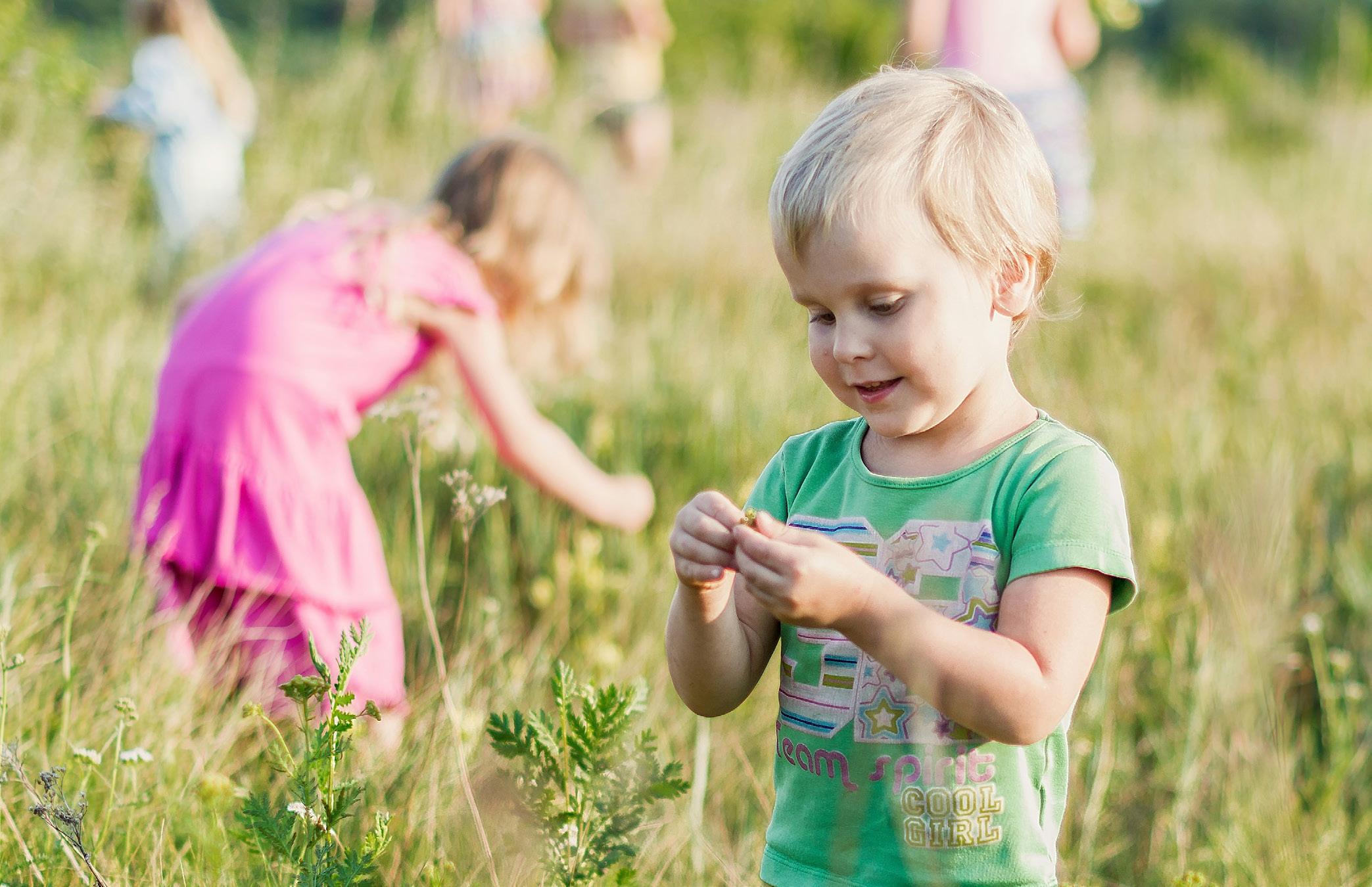
Grant applications, totaling over $690,000 in requests. However, just over $380,000 was available, leaving many deserving initiatives without funding.
“We are so thankful to everyone who has believed in this work,” said Finnerty. “Your support means more than you know — especially now, when the need is much greater than the funds available.”
The Foundation’s model focuses on endowed giving, where donations are invested, and the earnings are used to support causes year after year.
This allows donors to contribute to the causes they care about through the Foundation, enabling local charities to focus more on their mission and less on making ends meet.
Every act of giving, no matter what size, helps build a stronger, more vibrant
community. Whether through a legacy gift, a memorial donation, or a one-time contribution, your generosity will make a lasting impact.
“By starting a fund, you can help shape the future,” Finnerty added. “It’s a meaningful way to give back and support the community for generations to come.”
LEARN MORE
To establish a fund or designate a gift in your will, visit cvcfoundation.org.
O ur gratitude to the City of Cour tenay for contributing $50,000 through their Grant in Aid program this ye ar The City ’s generous s uppo rt provided additional funding to the following organizations :
Comox Valley Food Bank Society
LUSH Valley Food Action Society
Eureka Support Society
Upper Island Women of Native Ancestry Society
Comox Valley Transition Society
Stepping Stones Recovery House for Women Society


COMMUNITY ENRICHMENT GRANTS
$388,657 TO 30 ORGANIZATIONS
Awakened Faith Ministries - Bread of Life Food Share (covering ICMS)
Big Brothers Big Sisters of Victoria Capital Region
Comox Valley Arts
Comox Valley Family Services Association
Comox Valley Food Bank Society
Over $1M supported 53 charities, 65 students, and 30 projects
Including 2024/25 granting program recipients; designated Foundation distributions are not shown
ENVIRONMENT & CONSERVATION
$50,000 TO FIVE ORGANIZATIONS
Volunteer-led food access
School-based youth mentoring
Downtown community arts events
Early years family programs
Cold storage for food security
Comox Valley Healthcare Foundation Cognitive health therapy program
Comox Valley Transition Society
Courtenay Elementary Community School Society
Cumberland Community Schools Society
Cumberland Lake Wilderness Society
Dawn to Dawn Action on Homelessness Society
d’Esterre Seniors’ Centre Association
Eureka Support Society
Farm to Family Meals Service Society
Hornby and Denman Community Health Care Society
Hornby Festival Society
Hornby Island Athletic Association
Hornby Island Daycare Society
Hornby Island Education Society
Hornby Island Farmland Trust Society
Hornby Island Residents’ and Ratepayers’ Association
K’ómoks First Nation
Lake Trail Community Education Society
LUSH Valley Food Action Society
Operation Freedom Paws Canada
St. Peter’s Anglican Church Comox
Stepping Stones Recovery House for Women Society
Sunday Station Society
The Weird Church (Pacific Mountain Region
- The United Church of Canada)
Indigenous cultural supports
School kitchen upgrade
Local food access program
Adaptive canoeing equipment
Gukwas sa Wagalus (Rainbow House) programming
Kitchen oven to sustain service
Lunch program and training
Community intergenerational meals
School field trip funding
Festival support
Winter drop-in community cafe
Daycare inclusivity program
Supporting food and family programs
Upgrades for farm produce storage
Community hall accessibility upgrades
Cooking and wellbeing program
Community programming support
Indigenous food sovereignty project
Onsite trauma counsellor
Comox food bank enhancement
Expansion of transitional housing
Sunday weekly meal program
Accessibilty upgrades and food support
Upper Island Women of Native Ancestry Society Supporting Indigenous food security
NEIGHBOURHOOD SMALL GRANTS
$8,620 FOR 30 LOCAL PROJECTS
Small grants create big impact, empowering neighbourhood belonging and connection throughout the Comox Valley.
Beaufort Watershed Stewards Stream keepers training and surveying
Comox Valley Conservation Partnership Strategic planning
Comox Valley Project Watershed Society Community Water Monitoring Initiative
Cumberland Community Forest Society Cumberland Bat Project
Denman Conservancy Association Water monitoring project
SUPPORTING DIVERSE ABILITIES
$54,900 TO SEVEN ORGANIZATIONS
Beaufort Association for Inclusion in Action Programming support
Comox Valley Child Development Association Camp Sunshine
Comox Valley Therapeutic Riding Society Support for rider fees
Courtenay Recreation Adaptive Programs Adaptive programs
L’Arche Comox Valley I Belong Centre programming
Special Olympics Support for athlete costs
Vancouver Island Adaptive Snow Sports Adaptive snow sports
HOUSING & HOMELESSNESS SUPPORTS
$50,000 TO THREE ORGANIZATIONS
City of Courtenay Emergency winter response support
Hornby Island Housing Society Propane to heat pump transition
Soap for Hope Canada Amenities for community spaces
SCHOLARSHIPS & BURSARIES
$102,522 FOR 65 STUDENTS
Offered in partnership with Comox Valley high schools and North Island College, these awards provide financial support for post-secondary journeys anywhere in Canada.
COMMUNITY PROSPERITY FUND - PROVINCIAL GRANT
$365,000 TO EIGHT ORGANIZATIONS
Funded by the Province of BC, this program provided multi-year grants to the following organizations to advance poverty reduction and social inclusion in the Comox Valley.
Community Justice Centre of the Comox Valley Indigenous Women’s Sharing Society
Comox Valley Child Development Association LUSH Valley Food Action Society
Comox Valley Head Injury Society Pride Society of the Comox Valley
Hornby Island Educational Society Sunday Station Society
Thanks to partners like you, we continue to make meaningful investments in organizations that create lasting change in the Comox Valley.
Community Champion Sponsor
Impact Sponsors
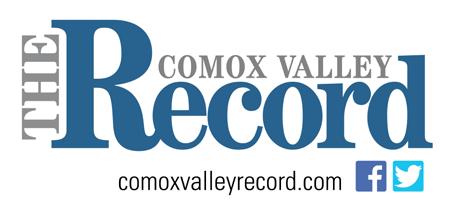

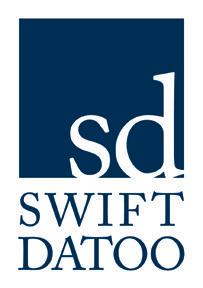

The Comox Valley Community Foundation is marking a major milestone this spring— moving into a new central location to better serve the Comox Valley for generations to come.
The purchase of the new office space at 917C Fitzgerald Ave. in Courtenay is a first for the Foundation, markings its first permanent home in the Comox Valley in nearly 30 years.
The Courtenay location ensures that the Foundation remains a central hub, allowing them to more easily connect and collaborate with partners while responding to community needs.
Designed to be welcoming and easy to reach, the new offices are within walking distance of many of the non-profits and organizations they are proud to support.
“I’m so grateful for the many organizations, donors, and board members whose ongoing support strengthens our ability to serve so many non-profits across the Comox Valley,” said Jolean Finnerty, executive director of the Community Foundation. “A special thank you to Cameron Contracting — their generosity and in-kind support truly made our new home a reality.”
The new offices are open Monday to Thursday from 9 a.m. to 4 p.m., with parking available on Fitzgerald Ave. and in the lot behind the building.
Since 1996, the Community Foundation has connected generous donors and supporters to distribute more than $7 million to organizations throughout the Comox Valley. The new space will allow them to grow their mission to enrich life in the Comox Valley for all.

